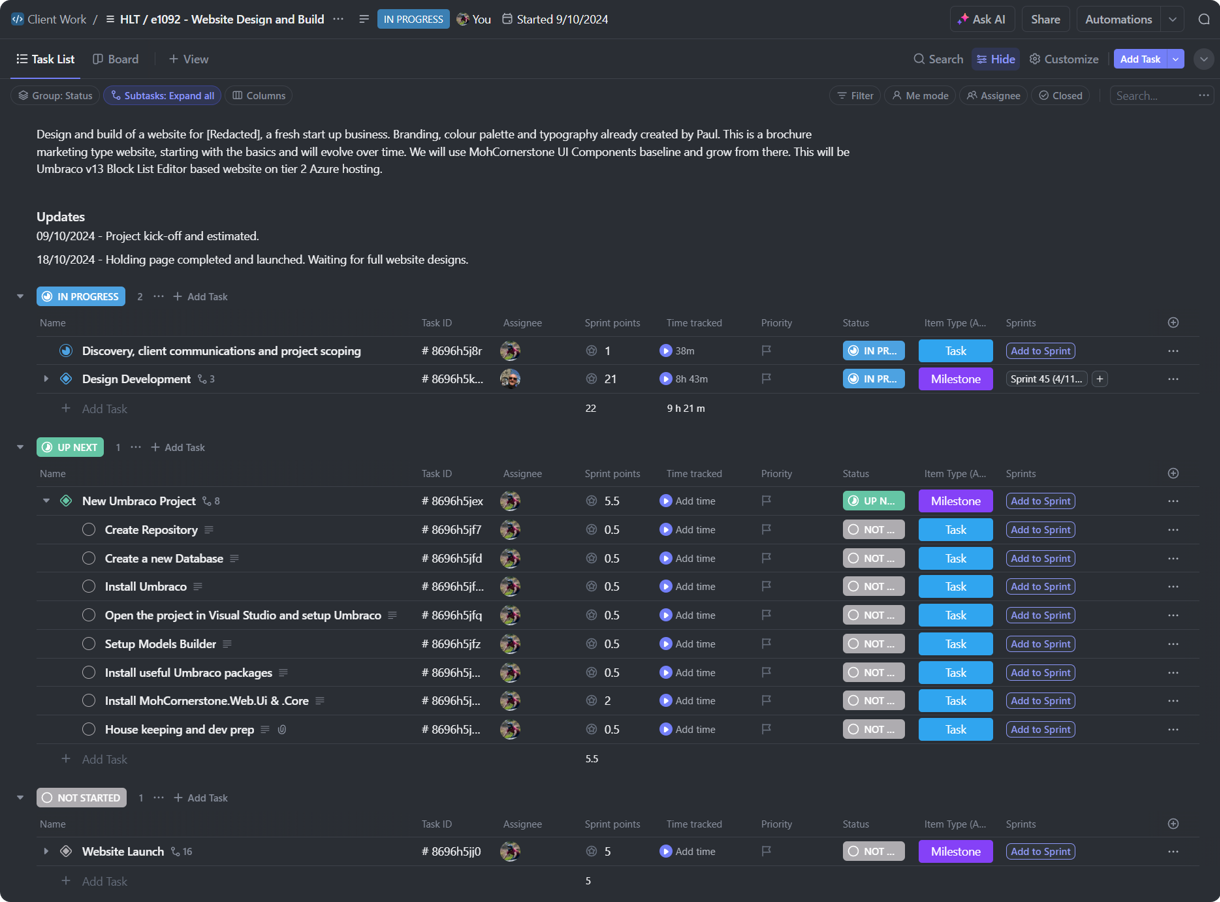Epics, stories & features
Meaningful Agile for smaller projects
Applying Agile to an agency that builds websites for small and medium businesses has been a constant struggle, and I've decided to let it go. Here’s why it doesn’t quite fit - and how we actually manage our projects.
Posted by Rob Mayes some time ago
I feel a bit of context is required. I'm am in no way an Agile or Scrum expert, but I have worked in teams that have successfully applied it to their suite of products. We work closely with hayman.dev who successfully apply it to their products, and when we combine forces for larger projects, Agile works great.
However... I've tried time and again to bring Agile (or Scrum, or whatever the latest trendy variant might be) into our day to day work – and, to be honest, I’ve struggled every time. This often leaves me a bit grumpy. In my experience, Agile doesn't seem to fit the needs of agencies or freelancers who build websites for small and medium businesses. That may not be a popular opinion, but I haven't found a way to make it work in a slick, effective way. So, as is often the case, I’ve ended up carving my own path through plenty of trial and error.
The Problem
The issue with standard Agile project management approaches is that they're designed for teams handling a smaller number of larger, ongoing projects - like companies managing two or three major software products, or agencies with a niche product that supplies multiple clients. These systems also work well for teams overseeing 5 to 10 large scale websites.
In contrast, we’re a small team managing 50 to 100+ small and medium business websites at any given time. Many of these sites go untouched for months or even years. If we kept a project list open for each site, including a backlog for each, our smaller, more granular tasks would get lost in an ocean of empty lists.
We tried this once, and finding relevant tasks became quite literally like searching for a needle in a haystack - it was a very short-lived trial!
Our Approach
So how do we tackle it?
While we do borrow a lot from Agile and Scrum principles, we adapt them to fit our workflow. Here’s how we make it work:
Projects
Rather than creating a project for every active website, we only open a project when there’s actual work to be done. Each project takes the form of a List in ClickUp. The List remains active for the duration of the project, and once completed, we archive it (to maintain an audit trail). Each List includes a pinned brief and project description, along with an owner, start date, and status (ranging from Scoping and In Progress to Complete).
A project could be the design and build of a new website, the addition of a News section to an existing site, or something smaller such as creating a new type of content block. Essentially any time we're asked to do some work, big or small, we open a project, complete the work and archive it.

Epics
Inside the Lists, we sometimes categorise work as Epics, though usually only on larger projects where an additional breakdown is helpful. They’re there if needed, but we don’t always use it.
Milestones
We then use Milestones, which for us serve a similar function to Stories or Features, though we use the term "Milestone" intentionally. Terms like "Story" or "Feature" felt off because these chunks of work rarely require a user story and aren’t always a new feature. For instance, performing an SEO (Search Engine Optimisation) audit on a website isn’t exactly a Story or Feature, but it is a clear, valuable step forward. Similarly, initial project setup tasks - like setting up a repository, installing Umbraco, or adding the mohunky Cornerstone UI Library - don’t require a User Story, and they are not Features, but are crucial Milestones before other work can proceed.
Tasks
Finally, we have Tasks, which we try to keep to 8 Sprint Points or fewer. We aim to make tasks manageable enough that they can be completed in a reasonable time, but not so granular that task management becomes a burden. Finding this balance is a mix of practicality and personal preference.
Wrap up...
I haven’t come across much useful guidance on applying Agile, Scrum, or any project management methodologies to businesses like ours. We’re a bit unique in that we supply Umbraco solutions to small and medium businesses, but this challenge isn’t unique to us by any means. This might not be a detailed breakdown of our processes, but I hope it offers enough insight to be helpful.
Read more posts...
How CHX Performance saved over £2,300 with Umbraco
Posted by Natalie Mayes last month
Why do reports show that Umbraco has lower user stats?
Posted by Natalie Mayes earlier this year
Let's chat
If you have a specific project in mind, or you’re not sure what you need, please get in touch - we’d be happy to chat, even if it’s just for friendly advice!


